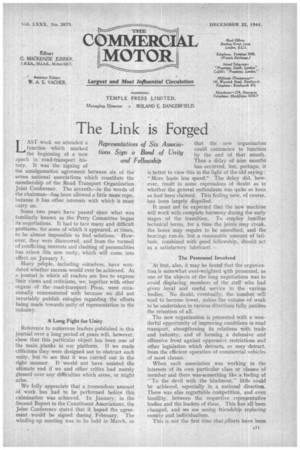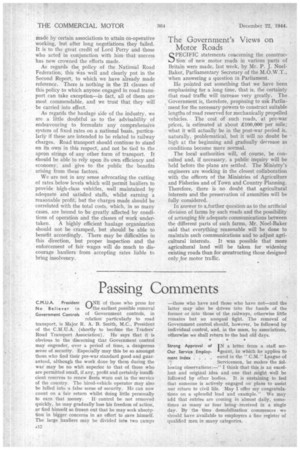The Link is Forged
Page 13

Page 14

If you've noticed an error in this article please click here to report it so we can fix it.
LAST week we attended a function which marked the beginning of a new epoch in road-transport history. It was the signing of the amalgamation agreement between six of the seven national associations which constitute the membership of the Road Transport Organization Joint Conference. The seventh—in the words of the chairman—has been allowed a little more rope, because it has other interests with which it must carry on.
Some two years have passedsince what was familiarly known as the Perry Committee began its negotiations. It had to face many and difficult problems, for some of which it appeared, at times, to be almost impossible to find solutions. However, they were discovered, and from the turmoil of conflicting interests and clashing of personalities has arisen this new unity, which will come into effect on January 1. Many pebple, including ourselves, have wondered whether success would ever be achieved. As a journal in which all readers are free to express , their views and criticisms, we; together with other organs of the road-transport Press, were occasionally remonstrated with because we did not invariably publish eulogies regarding the efforts being made towards unity of representation in the industry.
A Long Fight for Unity Reference to numerous leaders published in this journal over a long period of years will, however, show that this particular object has been one of the main planks in our platform. If we made criticisms they were designed not to obstruct such unity, but to see that it was carried out in the right manner. It would not have assisted the ultimate end if we and other critics had merely glossed over any difficulties which arose, or might arise.
We fully appreciate that a tremendous amount of work has had to be performed before this culmination was achieved. In January, in the Second Report to the Constituent Associations, the Joint Conference stated that it hoped the agreement would be signed during February. The winding-up meeting was to be held in March, so that the new organization could commence to function by the end of that month. Thus a delay of nine months has occurred; but, perhaps, it is better to view this in the light of the old saying: "More haste less speed." The delay did, however, result in some expressions of doubt as to whether the general enthusiasm was quite so keen as had been claimed. This feeling now, of course, has been largely dispelled. It must not be expected that the new machine will work with complete harmony during the early stages of the transition. To employ familiar technical terms, for a time the joints may creak, the bores may require to be smoothed, and the bearings run-in, but a reasonable amount of latitude, combined with good fellowship, should act as a satisfactory lubricant.
The Personnel Involved At first, also, it may be found that the organization is somewhat over-weighted with personnel, as one of the objects of the long negotiations was to avoid displacing members of the staff who had given loyal and useful service to the various bodies. No doubt, eventually, the. number will tend to become lower, unless the volume of work to be undertaken in various directions fully justifies the retention of all.
The new organization is presented with a wonderful opportunity of improving conditions in road transport, strengthening its relations with trade and industry, and of forming a defensive and offensive front against oppressive restrictions and other legislation which detracts, or may detract, from the efficient operation of commercial vehicles of most classes.
When each association was working in the interests of its own particular class or classes of member and there was.something like a feeling of " To the devil with the hindmost," little could be achieved, especially in a national direction. There was also regrettable competition, and even hostility, between the respective representative bodies and the leaders of these. This has all been changed, and we are seeing friendship replacing enmity and individualism. This is not the first time that ,efforts have been made by certain associations to attain co-operative working, but after long negotiations they failed. It is to the great credit of Lord Perry and those who acted in conjunction with him that success has now crowned the efforts made. As regards the policy of the National Road Federation, this was well and clearly put in the Second Report, to which we have already made reference. There is nothing in the 21 clauses of this policy to which anyone engaged in road transport can take exception—in fact, all of them are most commendable, and we trust that they will be carried into effect. As regards the haulage side of the industry, we are a little doubtful as to the advisability of endeavouring to formulate any comprehensive system of fixed rates on a national basis, particularly if these are intended to be related to railway charges. Road transport should continue to stand on its own in this respect, and not be tied to the apron strings of any other form of transport. It should be able to rely upon its own. efficiency and economy, and give to the public the benefits arising from these factors. We are not in any sense advocating the cutting of rates below levels which will permit hauliers to provide high-class vehicles, well maintained by adequate and satisfied staffs, whilst earning a reasonable profit, but the charges made should be correlated with the total costs, which, in so many cases, are bound to he greatly affected by conditions of operation and the classes of work under taken. A highly efficient haulage organization should not be cramped, but should be able to benefit accordingly. There may be difficulties in this direction, but proper inspection and the enforcement of fair wages will do much to discourage hauliers from accepting rates liable to bring insolvency. The Government's Views on Motor Roads SPECIFIC statements concerning the construction of new motor roads in various parts of Britain were made, last week, by Mr. P. J. NoelBaker, Parliamentary Secretary of the M.O.W.T., when answering a question in Parliament. He pointed out something that we have been emphasizing for a long time, that is, the certainty that road traffic will increase very greatly. The Governnient is, therefore, proposing to ask Parliament for the necessary powers to construct suitable lengths of road reserved for mechanically propelled vehicles. The cost of such roads, at pre-war prices, is estimated at about £100,000 per mile; what it will actually be in the post-war period is, naturally, problematical, but it will no doubt be high at the beginning and gradually decrease as conditions become more normal The local authorities will, of course, be consulted and, if necessary, a public inquiry will be held before the plans are settled. The Ministry's engineers are working in the closest collaboration with the officers of the Ministries of Agriculture and Fisheries arid of Town and Country Planning. Therefore, there is no doubt that agricultural interests and the preservation of amenities will be fully considered. In answer to a,further question as to the artificial division of farms by such roads and the possibility of arranging felladequate communications between the different parts of such farms, Mr. Noel-Baker said that everything reasonable will be done to maintain such communications and to adjust agricultural " interests. It was possible that more agricultural land will be taken for widening existing roads than for constructing those designed only,for motor traffic.




















































